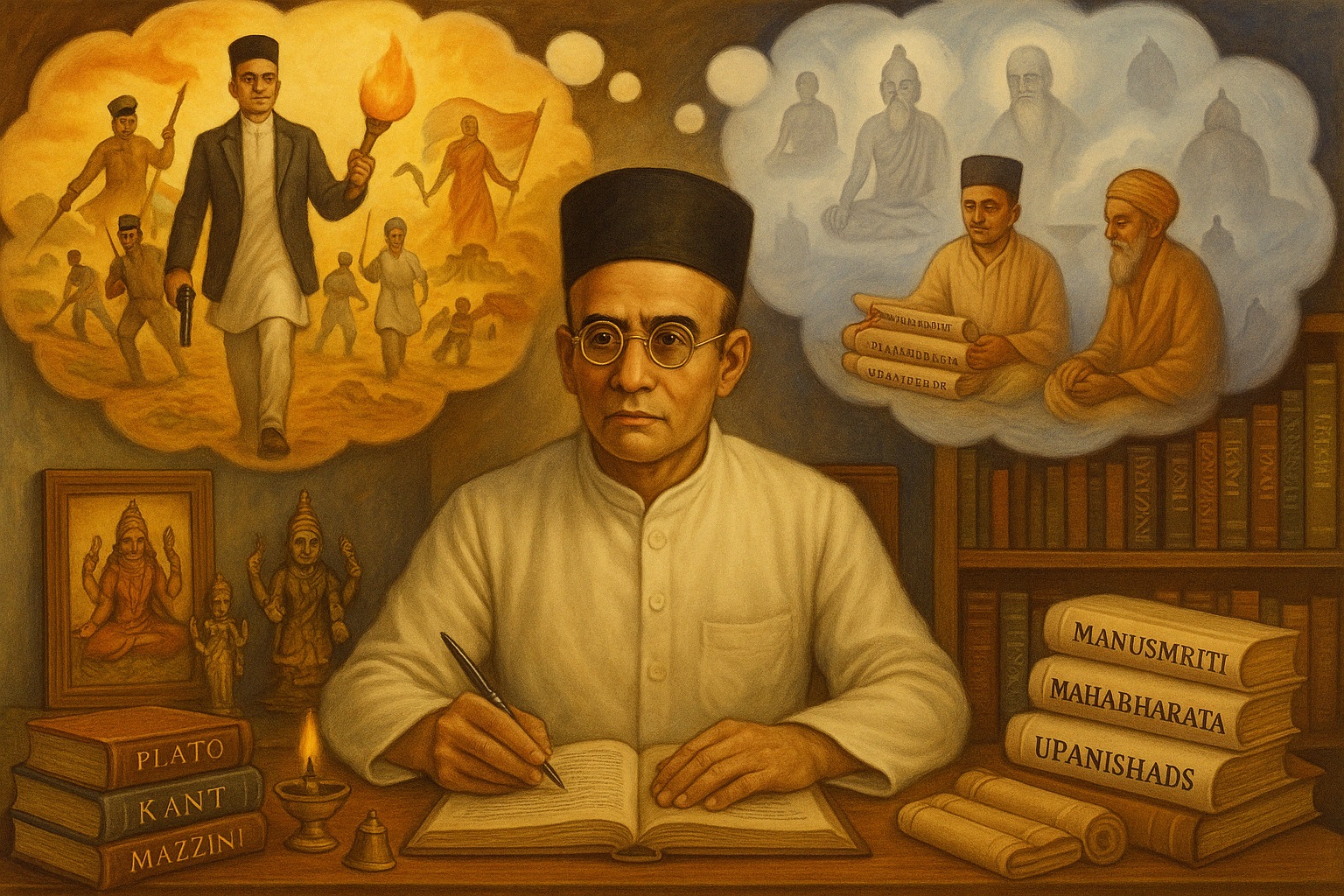Savarkar’s Philosophy & Worldview, Part 3
Vinayak Damodar Savarkar was a thinker who saw the world through the lens of a fundamental philosophical conflict: the opposition between the negation and affirmation of life. This divide, which he explored deeply, was not just an intellectual exercise for him—it shaped his understanding of Indian and Western philosophical traditions and their impact on societal progress.
The Philosophical Divide: Affirmation vs. Negation
Savarkar found resonance in the ideas of Albert Schweitzer, who asserted that the battle between world-affirming and world-negating philosophies must be constantly fought and won anew. In Savarkar’s view, both Indian and Western traditions contained elements of these two opposing streams. However, Indian thought, he observed, leaned predominantly toward world and life negation, whereas Western philosophy was largely oriented toward affirmation.
This distinction, however, was not absolute. As Schweizer pointed out, neither tradition is wholly committed to one perspective; rather, they exhibit tendencies toward one or the other. Still, for Savarkar, India’s predominant inclination toward life negation had profound social consequences, particularly in its effect on national progress and reform.
Savarkar’s Critique of Life Negation in Indian Thought
A dedicated student of religion and philosophy, Savarkar critically examined the pervasive influence of life-negating tendencies in Indian spiritual thought. While he acknowledged the depth and richness of these traditions, he saw them as a barrier to national progress.
Life affirmation, as understood by Savarkar, was the pursuit of tangible progress—actively working toward the betterment of one’s nation, society, and fellow human beings. Life negation, on the other hand, dismissed worldly endeavors as meaningless, often leading individuals to withdraw from efforts aimed at social improvement. Such a worldview, he believed, paralyzed action and discouraged necessary reforms.
Savarkar’s skepticism toward Indian philosophical traditions stemmed from their tendency to promote detachment from worldly affairs. As Schweizer explained, life affirmation is reflected in those who dedicate their lives to a cause, while life negation is found in those who lack a tangible goal or a drive to improve worldly conditions. For Savarkar, Indian thought’s emphasis on transcendence and renunciation often hindered the nation’s ability to strive for progress and self-empowerment.
Vedanta and Its Impact on Action
One of the primary philosophical systems Savarkar critiqued was Vedanta. He found its emphasis on ecstatic states of consciousness unnatural and detrimental to the cause of national awakening. In his view, Vedanta, while intellectually profound, was unsuited to a country struggling for freedom and self-reliance. He argued that while affluent Western societies might afford the luxury of such philosophical introspection, India’s immediate need was action, not withdrawal.
Savarkar cited historical examples to illustrate his point. He referred to Bajirao II, whom he saw as an embodiment of Vedantic passivity—someone unable to distinguish between ruling a kingdom and living off a pension. This, for Savarkar, underscored the real-world consequences of an overemphasis on detachment.
A Call to Action: The Need for World Affirmation
Savarkar’s own experiences reinforced his conviction that India needed a philosophy rooted in life affirmation. He recalled his deep dive into Vedanta, describing how it initially seduced him into a state of inaction. He found himself questioning the value of service, nationalism, and activism—until, ultimately, he snapped out of it, realizing that India’s struggle for independence required warriors, not ascetics.
For Savarkar, the path forward was clear. He rejected philosophies that preached detachment in favor of those that inspired sacrifice, struggle, and nation-building. To him, revolution and social transformation mattered far more than abstract metaphysical pursuits.
Final Thoughts
Savarkar’s critique of world and life negation was not just an academic exercise but a call to arms. He saw Indian society’s deep-rooted passivity as a fundamental obstacle to progress. By championing life affirmation, he sought to inspire a generation that would fight for India’s freedom and build a future rooted in strength, action, and national pride. In his view, it was not enough to contemplate existence – one had to engage with it, shape it, and, if necessary, sacrifice for it.
Sources:
SAVARKAR, Vinayak Damodar. 1950. The story of my transportation for life. Sadbhakti Publications: Bombay.
SAVARKAR, Vinayak Damodar. 1924. An Echo from Andamans. Vishvanath Vinayak Kelkar: Nagpur, in GROVER, Verinder. 1998. Vinayak Damodar Savarkar: A biography of his vision and ideas. Deep and Deep: Publications: New Delhi.
SCHWEIZER, Albert. 1935. Die Weltanschauung der indischen Denker. Mystik und Ethik. Beck Verlag: München.


Leave a Reply